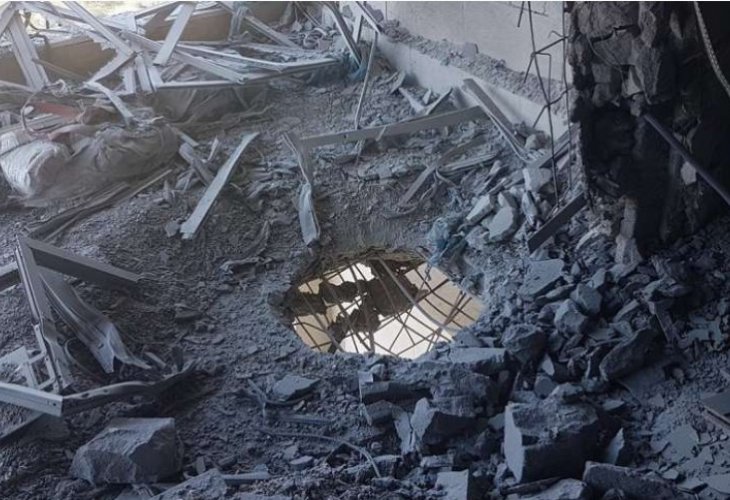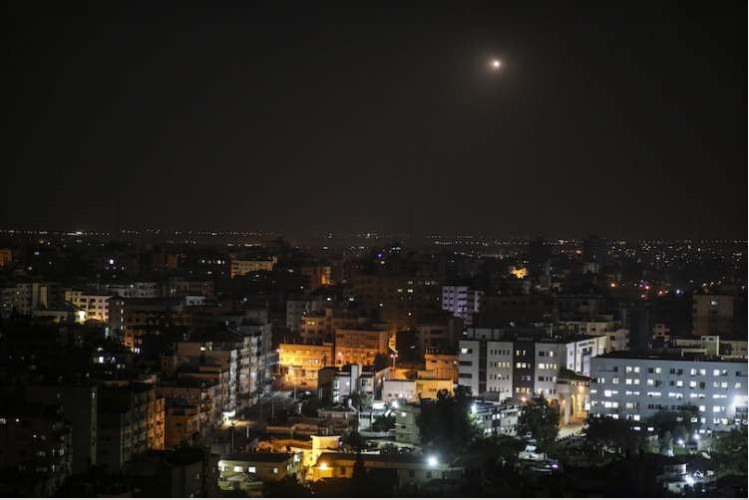"Explosions Were Heard, and My Heart Started to Tremble"; A Hidabroot Journalist Reports from Netivot
A Hidabroot journalist ventured into the field, discovering an abandoned city, missiles soaring overhead, an atmosphere fraught with fear and anxiety, and witnessed a dwelling hit directly just hours earlier.
 A house previously damaged in Sderot (Photo: Israel Police)
A house previously damaged in Sderot (Photo: Israel Police)"The whole country is a frontline," that's how the radio programs began this Tuesday morning. I naively thought that if the entire country is a frontline, it does not matter whether I am in Bnei Brak or Netivot. I started the car and drove. "He who wishes to become wise should turn south," is how it's said, but here, the closer I got, I understood that indeed, a wise person shouldn't be here. It all started at Yad Mordechai Junction, where a police car blocked my way. Consequently, I had to detour via Route 35. Further along, I realized that despite the hot weather, I had to keep my car windows open for any explosion that might occur, and they did. Every few minutes, explosions came out of nowhere; my heart started trembling. It was my first time inside this kind of arena. My eyes were no longer just following the road; they were looking at the skies, both literally and to Hashem above. In my heart emerged thoughts of repentance: "And when Moses lifted his hand, Israel prevailed. Was it his hands that made war? No, rather when Israel looked upwards and devoted their hearts to their Father in heaven, they would prevail, and if not, they would fall."

"We Experienced a Miracle"
I reached Netivot Junction, greeted by the sign: 'Welcome to Netivot.' I seemed to have gotten it wrong; this didn't look like the vibrant city full of shops and factories. Now the city was desolate and silent. Not a soul was on the streets; all stores were closed and locked tightly. Occasionally, a police car drove by, stopping to check if I perhaps had a woman in labor in my car; why else would I be wandering here like a tourist from outer space? Only then did I understand just how detached my world is from the ground reality and how much we in the central part of the country don't comprehend the feelings, fears, anxieties, and concerns of the southern residents living round after round of hostilities.
But the harder story I experienced was when I arrived at the Haddad family's house or rather what was left of it after the direct hit it took. Everything turned topsy-turvy; furniture and appliances were dislodged from their places due to the rocket's impact just a few hours earlier. It's hard to believe anyone came out of there alive. "I can't believe we survived; it was a visible miracle," Bat Sheva Haddad tells me. As the conversation progresses, I understand through her teary eyes that for them, it was akin to a second destruction of the Temple. "Five months ago, our home was destroyed. My eldest daughter Michali passed away after a ten-year battle with cancer, and now, I can't believe it, of all the houses in Netivot, the rocket chose to land right on my home. But I have full faith that Hashem is watching over us. Every bullet has its address."
Do you think you experienced a miracle?
"Of course, it was a miracle, not just one but several miracles. First, my daughter, who usually sits in the room upstairs, never in a hurry to go down to the shelter, had the thought to head to central Israel at that moment. Therefore, she wasn't home. I don't want to imagine what would have happened if she were home, God forbid. The second miracle, I believe, occurred because of Michali, of blessed memory. It happened in the shelter, which is her room. Usually, when there's an alert, we go into the shelter room but don't lock it. This time, for some reason, I had a bad feeling, and I told my husband, 'Meir, lock the door.' As soon as he locked it, I heard a loud explosion, darkness and smoke filled the house, even the water heater exploded, adding to the confusion, and I began to scream and cry; I was in shock, the entire house was destroyed."
In the ceiling of the Haddad family kitchen, a large hole was ripped open by the damned rocket from the Islamic Jihad, but according to Bat Sheva Haddad, "The rocket can break stones, but it cannot break the spirit and the faith. Look at what's left of the kitchen, pictures of revered rabbis like Rabbi Yoram Aberjil, of blessed memory, the Lubavitcher Rebbe, of blessed memory, and my Michali, may she rest in peace. Yesterday, long before this escalation began, I walked with a sense of suffocation, cried all the time, even in my work as a teacher, I told my students, 'Today, I will share stories of faith about Michali,' and started crying with them. Nobody understood what happened to me, nor did I. Now I understand that perhaps a decree was made, and my Michali watched over us from above and annulled it."
What will you do now? Which home are you returning to?
"Currently, we've received a vacation at the Dead Sea from the state, along with warm embraces from the people of Israel, who wrap us in warmth. On Sunday, we need to start looking for an apartment to rent. Hopefully, by then, there will be some calm, and we'll return to a sort of routine until the next round."
Doomsday Weapon
I finished at the Haddad family's house but didn't really finish. At this point, I turned to speak with Yaakov Maalimi, the deputy mayor of Netivot. It's not that he had time for me; he was busy and troubled, continuously receiving new requests – one moment, it's a family needing to celebrate their child's Bar Mitzvah without a venue, another moment, it's an elderly person wanting to know who can stay with them overnight to help them if an alert is sounded, and then there are the families insistent on understanding whether the ceasefire is really approaching or just rumors.
Maalimi is seated in the special and fortified command room established by the municipality of Netivot, thoroughly occupied. "We are currently in the midst of a war," he tells me. "Sure, outside it seems quiet and calm, but at these moments, thousands of children are sitting in shelters, and there are urgent social developments we need to address swiftly. Every moment a new plea arrives, and a well-trained welfare team rushes to address the event as if it's a fallen rocket." He emphasizes: "Thank God, it's noticeable that this time there is more citizen compliance to the Home Front Command's instructions, resulting in fewer human casualties. The case of the Haddad family illustrates just how adherence to instructions saves lives."
How do you cope with thousands of children sitting for hours in shelters?
"This is precisely why our command room is staffed with creative people constantly thinking of engaging activities for the kids. For instance, at this moment, various performing groups are stationed in central shelters, keeping the kids occupied. There are even clowns moving from shelter to shelter, and thank God, I can say that in this current round, there are fewer instances of anxiety, thanks to Hashem and the proactive preparation by the mayor."
What are the plans going forward?
"I know as much as you do; nobody knows what those attackers in Gaza have in mind, but the Southern Command General visited our command room, coming to support and encourage. According to his assessment, the round isn't over yet. Therefore, we continue with full vigor, reassuring the residents of Netivot."
Being in the Netivot municipality's command room offers a sense of sanity amidst a battle arena; there's no need to fear every moment from an alert catching me off guard. Truthfully, I didn't want to end the conversation with Maalimi, not because I thought he had any secret military information to share with me, but because of the sense of security the command room emanates. But every Shabbat has its end. I departed from the command room, headed back to central Israel, and at one of the junctions, I already felt as though the Islamic Jihad decided to use a doomsday weapon. I never understood the meaning of a doomsday weapon until I had to exit my vehicle and lie on the ground with a prayer in my heart: May this be the final campaign and may no one be harmed.

